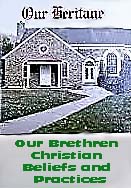TRUE
SCIENTIFIC INVESTIGATION-NOT LIKE TODAY
“Forasmuch as many have taken in hand to set forth in order a
declaration of those things which are most surely believed among us, Even as
they delivered them unto us, which from the beginning were eyewitnesses, and
ministers of the word; IIt seemed good to me also, having had perfect
understanding of all things from the very first, to write unto thee in order,
most excellent Theophilus, That thou mightest know the certainty of those
things, wherein thou hast been instructed.”
Luke 1:1-4
Here Luke reveals the method of his work. First he says that
he traced the course of all things accurately from the beginning. That is an
important alteration from the old Version, which makes it look as though Luke
meant, he knew all from the beginning. He means the exact opposite. He obtained
all the material; and then he traced the course of all things accurately. This
was the work of scientific investigation of the whole of the stories he had
gathered about Jesus. The same for the disciples and their three year journey and ministry alongside Christ, gathering facts, being taught, and coming to conclusions. The wisdom they attained was from above.
In this
connection he employed a word which arrests us. He says he traced the course of
all things "anothen." We
have rendered that, "from the
first." Now, that word in Greek use does sometimes mean "from the first," but it also
means "from above." In
strict etymology, I think the probability is that it means "from above." Note one or two occurrences of the same
word. Jesus was talking to Nicodemus, and said: "Ye must be born anothen." The old Version rendered
that "again." The Revisers
have rendered it, "anew,"
and "born from above" in
the margin. I am quite sure Jesus meant, "from
above." Take another illustration. "The
wisdom that cometh down anothen." There it must be "from above." My own view is
that when Luke says he traced the course of all things accurately "anothen," he meant from
above; and that he was claiming that his scientific work was under the guidance
of heaven itself, that he not only brought to bear upon his work his own
scientific ability to sift and trace; but he sought guidance from heaven. That
is how he prepared his material.
And
then he says he wrote "in
order." This phrase "in
order" is one word in the Greek, Kathexes, which is the word of the
artist. He claims that having obtained his material, and sifted and examined
it, and put it in proper relationship; he wrote it in artistic order.
This
preface to Luke is by analogy a remarkable revelation of how inspiration
wrought in the producing the historic literature of the Bible. Luke was
conscious that he did his work under Divine guidance. His use of the word “anothen” suggests that. This word is
translated "from the first"
but more accurately "from
above." Luke used it in that sense. He was no machine for he used the
scientific method to bear upon his material.
In this formal preface, Luke is extremely
careful to describe his method of researching and compiling material for his
gospel. He stresses: (1) the corroboration of eyewitnesses (vs. 2; also cp. 1 John 1:1); (2) scrupulous handling of truth (vs. 2, "handed
down," and vs. 3, "carefully investigated");
(3) comprehensive study (vs. 3, "investigated everything from the
beginning"; cp. Acts 1:1, "all that Jesus began to do");
(4) correspondence of written material with divine purposes and activities,
i.e. the presence of inspiration (vs. 4,
"certainty"); (5) orderly
presentation (vs. 1, "draw up an account," vs. 3, "orderly account"). Such human care does not in the least
lessen the role of the Spirit in directing the writer (for the origin and
certainty of prophecy, see 2 Pet 1:19 -
21).
Both the 1917 <Scofield Reference Bible> and the 1967
<New Scofield Reference Bible> point out that the phrase in vs. 3, "from the beginning," is from the Gk. <anothen>
(adv., from ano, which can mean "up,"
"upward," or "above"),
which is translated elsewhere, in some cases, by "from above" or similar phrases (John 3:31; 19:11; James 1:17; 3:15,17; but cp. Acts 26:5, where it is translated "for a long time"). According to this view, Luke's use of
<anothen> is an affirmation that his knowledge of these things, derived
from those who had been eyewitnesses from the beginning (vs. 2), was confirmed by revelation. In like manner Paul had
doubtless heard from the Eleven the story of the institution of the Lord's
Supper; but he also had it by revelation from the Lord (1 Cor 11:23) and his writing, like Luke's knowledge, thus became
firsthand and not simply traditional.
















